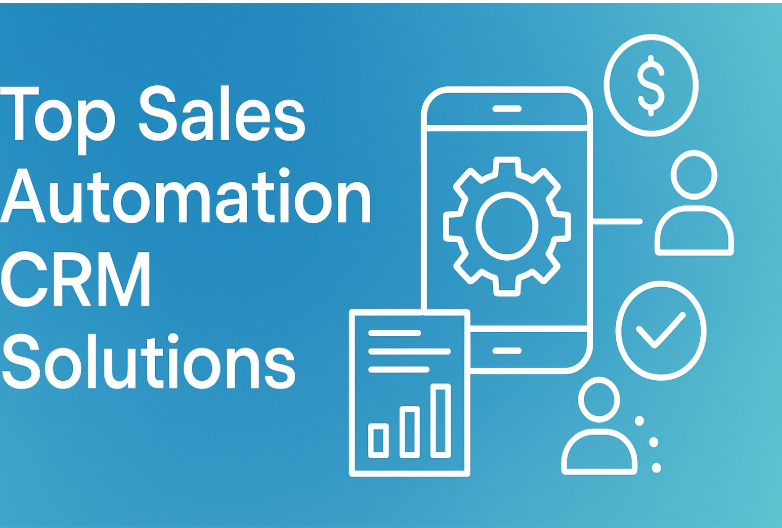Top Sales Automation CRM Solutions: Drive Efficiency and Maximize Conversions

In the fast-paced digital economy sales automation CRM systems are no longer optional – they are vital to a company’s growth strategy. These tools not only streamline sales processes but also empower teams to focus more on closing deals and less on repetitive administrative work. From prospecting to nurturing leads and managing pipelines, sales automation CRM solutions have redefined how modern sales departments operate.
Sales Automation Definition
Sales automation refers to the use of technology to streamline, standardize, and optimize repetitive and time-consuming sales tasks. It involves automating actions such as follow-up emails, lead assignment, data entry, pipeline tracking, and reporting. By reducing the human burden on manual tasks, sales reps can dedicate more time to building relationships and closing deals.
Sales automation often integrates with customer relationship management (CRM) systems to ensure seamless handling of customer data across the buyer journey.
What is Sales Automation Software?
Sales automation software is a platform or tool that helps automate routine sales functions. These platforms typically include features like:
- Automated lead generation and scoring
- Workflow management
- Email sequencing and outreach tools
- Real-time performance dashboards
- Contact management
- Forecasting and analytics
The ultimate goal of sales automation software is to increase productivity, reduce errors, enhance the customer experience, and scale the sales process with minimal manual intervention.
Many solutions are built into or integrated with CRMs – creating the dual benefit of automation and customer data centralization.
5 Reasons to Invest in Sales Automation Software
Implementing sales automation software can be transformative for businesses, especially those experiencing rapid growth. Here are five compelling reasons to consider investing in it:
1. Boost in Productivity
Sales reps spend nearly 60% of their time on non-selling activities like data entry or searching for information. Automation reduces this burden by handling tasks like email scheduling, call logging, and data updates, allowing teams to focus on selling.
2. Faster Response Times
Automated lead routing and response emails ensure that prospects are followed up within seconds, improving lead engagement and conversion chances.
3. Improved Lead Qualification
Lead scoring models can prioritize leads based on interaction behavior and demographic data, enabling sales reps to focus their efforts where they matter most.
4. Consistency in Sales Processes
Automation ensures standardized workflows across teams. This minimizes errors, aligns strategies, and maintains compliance, especially in highly regulated industries.
5. Better Forecasting and Reporting
Automated reporting tools provide real-time visibility into pipelines, helping managers make informed decisions and improve strategic planning.
What is the Difference Between CRM and Sales Automation?
Although CRM and sales automation are often used together, they serve different purposes within an organization. CRM, or Customer Relationship Management, is primarily focused on managing relationships and customer data.
Its main function is to store information, keep track of communication history, and monitor the customer journey. Typical tasks performed with CRM systems include storing contact details, tracking customer interactions, and managing support tickets. As a result, CRM systems are commonly used by sales, marketing, and customer support teams.
On the other hand, sales automation is designed to streamline and automate repetitive sales tasks. It focuses on workflow automation and productivity enhancement, helping sales teams work more efficiently.
Common tasks for sales automation systems include sending follow-up messages, assigning leads, and tracking sales emails. These tools are primarily used by sales teams to boost their productivity and optimize the sales process.
In most modern platforms, sales automation is a feature or module within a CRM system. Together, they provide an integrated solution that drives both relationship management and operational efficiency.
10 Best Sales Automation Software Tools (2025 Edition)
1. Bitrix24
Best All-in-One Sales Automation CRM
Bitrix24 is a powerful platform that combines CRM and sales automation in a single suite. Its automation features cover the entire sales cycle – from lead generation to deal closure.
Key Features:
- Automated deal workflows
- Lead scoring and segmentation
- Multichannel communication (calls, emails, social)
- Sales funnel and performance analytics
- AI-powered Copilot assistant
Pros:
- Free plan available
- Built-in project management and team collaboration
- Robust automation rules
Cons:
- Learning curve for advanced features
2. HubSpot Sales Hub
Best for Inbound Sales Automation
HubSpot offers an intuitive CRM with extensive sales automation features, ideal for inbound-focused teams.
Pros:
- Easy to use
- Seamless integration with HubSpot marketing tools
- Advanced workflow automation
Cons:
- Premium features get expensive
3. Pipedrive
Best for Visual Pipeline Management
Pipedrive offers user-friendly pipeline views and automation tools for tracking deals and automating follow-ups.
Pros:
- Simple interface
- Customizable pipelines
- Workflow automation with triggers
Cons:
- Limited marketing automation features
4. Salesforce Sales Cloud
Best for Large Enterprises
Salesforce offers unmatched customization and scalability. Its automation capabilities span from lead routing to predictive analytics.
Pros:
- Highly customizable
- Powerful AI tools with Einstein
- Enterprise-grade features
Cons:
- Steep learning curve
- Higher price point
5. Zoho CRM
Best for Budget-Friendly Automation
Zoho offers a solid set of automation tools at a competitive price. It’s especially suited for SMBs.
Pros:
- Affordable plans
- SalesSignals for real-time alerts
- Blueprint automation workflows
Cons:
- UI can feel dated
6. Freshsales (by Freshworks)
Best for AI-Powered Automation
Freshsales combines sales automation with built-in AI to score leads and automate outreach.
Pros:
- Built-in phone and email
- Freddy AI for insights
- Automated sequences
Cons:
- Limited integration with third-party tools
7. Close
Best for Inside Sales Teams
Close is a CRM built specifically for fast-paced sales teams focused on calling and emailing.
Pros:
- Power dialer and call automation
- Email templates and sequences
- Built-in call tracking
Cons:
- Not suitable for complex workflows
8. Keap (formerly Infusionsoft)
Best for Sales & Marketing Automation
Keap is ideal for businesses that want a hybrid of marketing and sales automation.
Pros:
- Advanced email and campaign automation
- Payment and invoicing integration
- CRM and e-commerce tools
Cons:
- Steep onboarding process
9. Outreach
Best for Sales Engagement Automation
Outreach automates outreach, follow-ups, and engagement, helping reps reach more leads efficiently.
Pros:
- Sales sequences
- Performance analytics
- Multichannel engagement
Cons:
- Expensive for small teams
10. Salesflare
Best for Startups and Small Teams
Salesflare offers a lightweight CRM with automation built in, perfect for early-stage companies.
Pros:
- Automatic data entry
- Email tracking and workflows
- Simple UI
Cons:
- Limited scalability
Top Sales Automation Use Cases
Here are the most impactful ways businesses use sales automation CRM tools:
- Automated Lead Nurturing
Send personalized email sequences based on user behavior and funnel stage. - Lead Scoring and Qualification
Automatically prioritize leads using behavioral and demographic data. - Follow-Up Reminders and Scheduling
Set triggers to send follow-up emails or schedule calls after specific actions. - Cold Outreach Automation
Automate cold emails, LinkedIn messages, and calling cadences for outbound campaigns. - Deal and Pipeline Updates
Automatically move deals through stages and assign tasks based on activity. - Task and Workflow Management
Create automation rules to assign leads, set due dates, and notify team members. - Quote and Proposal Generation
Generate and send personalized proposals or quotes based on customer data. - Sales Reporting and Analytics
Automatically compile sales performance reports and forecasts using live data. - Meeting Scheduling
Use integrated calendar tools to automate meeting bookings with prospects. - CRM Data Entry and Syncing
Eliminate manual data entry by syncing lead information from emails, forms, or calls.
These use cases not only save time but also improve consistency, accuracy, and overall sales effectiveness.
Conclusion
Sales automation CRM tools are transforming how companies approach lead nurturing, deal closure, and revenue growth. By minimizing manual effort and ensuring consistent follow-up, these tools not only make sales teams more productive but also improve the customer journey from start to finish.
Whether you’re a small startup looking for simplicity or a large enterprise needing advanced automation, there’s a solution on the market tailored to your goals. Bitrix24, HubSpot, and Salesforce lead the pack with comprehensive features, but each tool on this list brings unique value depending on your sales structure.
Start by identifying your bottlenecks, prioritize ease of use and scalability, and invest in a platform that will help you automate smarter – not just faster.




